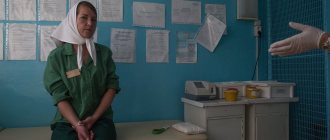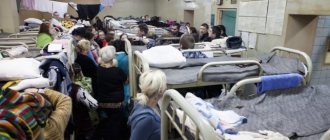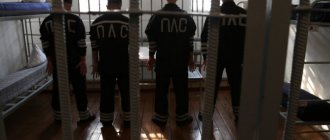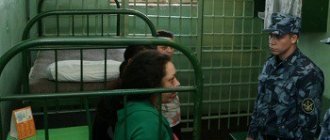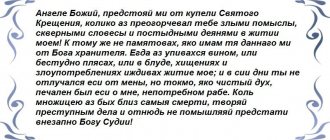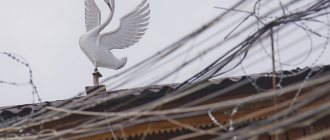From today on the pages of Snow. TV opens with “Diary of a Prisoner”.
Convicted under Art. 318 of the Criminal Code of the Russian Federation (“use of violence against a representative of the authorities”) for one and a half years; spent six months in a pre-trial detention center (pre-trial detention center) in the “red” zone. Author of the blogs “Arrestantka.ru” and “Arrestant Zen”.
With my stories, I want to change the opinion of those around me about the prisoners and convey to them that due to a judicial error, their mothers, daughters, sisters, wives may also end up behind bars.
So, from the very beginning.
How does a women's prison work?
Women's prison is hell for any normal woman. Absolutely all women’s prisons in Russia are “red”, that is, they are “run by jailers.”
Some people may not know, but a women’s prison is a pre-trial detention center, a cell-type facility in which prisoners are kept.
There are different cells with special contingents here.
- Cells with female BSnitsa, i.e. with former employees of the authorities. In such cells you can meet former judges, prosecutors, investigators, bailiffs, and employees of the Federal Penitentiary Service.
- Killer cameras. Oddly enough, most female killers do not deny their crime during the investigation and trial.
- Cameras for repeat offenders. Prisoners who have repeatedly committed crimes.
- The “first-time” cells contain female prisoners who are entering a women’s prison for the first time.
- Youngsters' cameras. Criminals under 18 years of age.
- Mommy cams.
- Cells for pregnant women or those giving birth in prison.
Many people are interested in how “first-timers” learn about the rules of prison life if they are kept separately from repeat offenders.
All this thanks to the judicial and prison system. For example, an expunged conviction. If the prisoner commits a repeated crime, he can again end up in a cell with the “first-timers” and “enlighten the inexperienced.”
Such a neighborhood is possible only if there is “friendship with the jailers.”
© pexels.com
Story one. Anna and the mistakes of her youth
The girl opposite is 27, I wouldn’t give it more than 21. Cheerful disposition, teenage style of clothing, ease of communication, mischievous eyes. When I find out what she was convicted of, for a second I think that I misheard, or is she cynically joking: Article 228 of the Criminal Code? Drugs?
Anya appeared in the “five” a year and a half ago - she was transferred for good behavior from a general regime colony in Orel, where she spent more than two years.
She calls everything that happened to her “before” a mistake of her youth. And, most likely, he perceives what happened as a protracted adventure. The girl was born and raised in Bryansk, and came to Moscow to study - she managed to get a pedagogical education and become a certified foreign language teacher. And then - people in uniform, detention, charges of “illegal acquisition and possession”, court, handcuffs, colony.
“I wanted to hang out,” explains Anna, admitting that she used it from time to time, “at the institute it was quite common. Mom is worried, blaming herself for missing me. And I? I dissuade her, because I know for sure that everything is my fault - I did all this with my own hands.”
Today, my mother actively supports her daughter, comes and visits. In addition to her, Anna’s loved one also visits the colony, who did not abandon the girl and assures that he is waiting. Periodically, my grandparents, who live in Odessa, send greetings. The only one of her relatives who turned away from her was her uncle; he stopped communicating with her niece.
Anya believes that, despite everything, her life is just beginning. “At first it was very difficult, in the first year of my term I thought that life was over, faith in God helped. I think that now, as in the famous film, everything is just beginning for me,” says the girl.
In addition to reading classical literature, Anna became addicted to drawing in the colony - and before that she had not noticed such talents in herself.
Like all her friends, Anna is waiting for the time when she can apply for parole.
“You have a crisis there, the dollar is rising, and we live in a different reality - meetings with loved ones, competitions... Plans after release? Of course have. First of all, find a job, maybe they will hire me as a translator, although it will be difficult to get a job with a criminal record. I would no longer want to go to prison, I need to return to a normal life, start a family, I hope that everything will be fine for me,” the girl concludes.
In the colony, Anya discovered her talent for drawing.
“There are no guards in women’s prisons!”
Actually there is. The jailers believe that in any “herd” there must be a “leader”. The fact that prisoners are considered a “herd” does not surprise anyone in prisons. Some overseers openly declare this: “we are shepherds and tend the flock!”
So, the “senior behind the hut” is appointed by the jailers themselves. And to help her, they assign a couple of activists who perform dirty physical punishment (later I will talk about the methods of torture in a women’s prison).
But there are women’s cells, where the “elder” is chosen by the inmates by voting. Of course, after this she “passes an interview” with the main jailer, and if “the candidate is not suitable,” then the prisoner will end up in the press hut after a while.
Viburnum flowers
In recent years, according to a prison employee, among the “special contingent” there are more and more young people – 20-30 year old girls. Another trend is the growing number of people convicted of non-payment of child support.
“This category is not delayed - the period of their stay in captivity is 2-4 months, but many, having been released, after some time come to us again. After prison, women return to their usual lifestyle and environment, and their alimony debt only grows,” says the head of the colony-settlement detachment, Svetlana Bychkova.
It is the head of the detachment who is the first person who meets new arrivals here. Svetlana has held her position for 10 years, and despite the fact that she has a solid work experience in the penal system, she considers this area close and “her own.”
Svetlana Bychkova says that she feels sorry for each of her charges. She comes up with competitions for convicted women and holds cultural events in which her charges gladly take part. On the one hand - entertainment, on the other - another form of re-education. On Svetlana’s initiative, five years ago the colony began holding “Kalina Flowers” - a creative beauty contest for convicted women, where they not only demonstrate the ability to present themselves, but also their talents, and even erudition. And before the start of the competition, the colony is “humming”: in the corridors and rooms there is only talk about the upcoming competition.
“Not all newcomers make contact right away,” says Svetlana, “the girls are different in character, lifestyle, education, but then they slowly open up, talk about themselves and begin to share news from their personal lives - who they called (we have a landline phone for connections), who is expected on a date. Parents of convicts and their husbands are frequent guests of the institution; in most cases, men do not leave their other halves.”
If a woman is expecting a child (which is not uncommon here), she is under the constant supervision of a health worker. After birth, babies are usually taken away by their relatives; if this is not possible, then they are left with their mother, giving them a separate cell. And the newborn becomes the object of special care, which is shown by both convicts and employees, bringing toys and diapers from home.
There is a school at the colony, and if there are orders, there is a sewing workshop.
But women, regardless of status, remain women. And, according to Svetlana Bychkova, the local inhabitants spend most of their time paying attention to themselves and their appearance - trying to lose weight, spinning hoops, doing gymnastics, and making themselves beautiful. And often, when leaving the colony, the convict is so transformed that it is difficult to recognize her as the same woman.
“I feel sorry for all of them, and I am firmly convinced: “Don’t swear off money or prison,” says Svetlana. “One drowned a child in a bucket, another threw a little daughter from the seventh floor. Humanly speaking, you can have different attitudes towards their actions, but for me, all the wards are equal, each is a human being, even if she has stumbled.” Although psychologically it is not at all easy to listen to such stories. As well as daily immersion in this multi-layered atmosphere, in which there is a place for tears of joy, and repentance, and anger at the world around us.”
Women remain themselves even in captivity. Shoe shelves in a colony settlement.
Women's press huts
Yes, yes, in the women's prison, as in the men's prison, there is a press hut. Only the jailers and those who passed through them know about these women's cells.
Moreover, there is more than one such press hut in the prison.
- Press hut with female killers. They can be transferred to such a cell for many purposes, even for suicide.
- Press hut for transit women. Through this chamber they “work out” those transported. Sometimes, prisoners are specially “taken” around all prisons through a transit hut so that she will rat out her accomplices. Such cells are in a terrible state, infested with rats and cockroaches. And the “elder” in this cell can be such a complete scum that life in a cell with murderers can seem like paradise.
- Press hut assorted. Both lesbians with sexually transmitted diseases and prisoners with an open form of tuberculosis can be held here. They keep silent about their illnesses here, especially in front of the “healthy prisoner” who was transferred for “workout”.
Few prisoners who have passed through the press huts remain sane.
But there are some prisoners who describe the women's prison as a pleasant experience. More than 50 percent of these “lucky prisoners” are drug addicts who can also go to prison for theft. Of course, for these women in freedom there was only one main thing - it was a “needle in a vein”, and they didn’t give a damn about life and amenities in the basement or entrance, just like they didn’t care about abandoned children.
After two days of withdrawal symptoms, a heavenly prison life opens before their eyes. Here they will be dressed up and dressed up by their cellmates, and the prison will fatten them with gruel. They are grateful for such prison food, because, “spending all their money on drugs,” they could also eat from the “garbage.” It is these “grateful prison inmates” who join the ranks of activists and executioners in press huts.
© pexels.com
Women's correctional colony (63 photos)
There are six women’s colonies in Kazakhstan, the total number of women and girls serving sentences as of August 1 of this year is 2,901. The women’s correctional colony UG-157/11 in the city of Atyrau opened three years ago, with a total of 234 prisoners from four regions. Vox Populi correspondents visited the women's colony to tell and show readers how they live in the correctional colony and who they are - women whom the court deprived of their freedom.
1. All women’s colonies in the country are general regime, except for the colony in Karaganda, where “walkers” (prison jargon) are women who have been repeatedly convicted
2. Twice a day, convicts gather on the parade ground for inspection. Absence is considered a gross violation, for which you can be sent to a punishment cell. Such a note in the personal file is undesirable, as it affects parole and transfer to a settlement colony
3. After the check, all women go to their workplaces or squads. White scarves are a mandatory part of the uniform
4. The conditions of stay in UG-157/11 are as close as possible to a standard women's dormitory. Five squads, each containing approximately 50 women, are housed in their own blocks. In each block, in addition to the bedrooms, there is a common teahouse, a storeroom, and a guest room. There is a common bathhouse, laundry and ironing room
5. Four women live in each room. According to the charter, they have no right to sit or lie down on the bed from nine in the morning to seven in the evening. It's austere here and smells of bleach
6. Each detachment has its own foreman, an authoritative person who knows how to eliminate internal conflict situations and maintain peaceful coexistence among several dozen women with a difficult fate and character. Brigadiers of detachments or, more simply put, “bugs” are people with untouchable authority. The foreman has a deputy, an orderly (sanitary troika), a foreman-orderly, assistants responsible for the storeroom, the kitchen, the teahouse and the leisure and sports section (SDS)
7. In the relaxation room, prisoners can be alone with themselves. Three psychologists constantly monitor the well-being of prisoners. Each convict receives an individual approach. In the zone, the emotional state of women is extremely unstable
8. In the evenings, women gather in front of the TV. They watch news and TV series, the most popular being Turkish. It should be noted that the smooth life of the colony largely depends on the attitude of the convicted women themselves. The paintings on the walls were done by the prisoners themselves.
9. Kapterka. One convict was released today. The employees escorted her to the station. The head of the zone contacted the Aktobe Center for Adaptation and Rehabilitation of Convicts and asked for help with accommodation and employment. Despite loud laughter and joy, the liberated woman feels anxiety and notes of fear: “How will everything turn out in the wild?”
10. The most popular product in the zone is payphone cards. Prisoners may not see their loved ones for years, since many women’s families live in neighboring regions, and it is not always financially possible to come for a long-term visit. And that’s why they keep in touch via phone. But there is a limit to such conversations. Every convicted person has the right to 15 minutes of telephone conversation per day
11. Convicts are completely supported by the state. In addition, they have transmissions from relatives. They can buy everything they need at a local store once a month. Cigarettes are second in importance. Almost everyone smokes, regardless of age and position. They don’t quit here, they start smoking here. There is no other way to calm down
12. Here, in the zone, there is a special atmosphere - sincerity or falsehood is immediately determined. Women stick together in “families”; family members are not offended. The head of the family is the queen, the rest are princesses
13. The sauna block works almost every day. The administration met the prisoners halfway and allowed them to equip a shower room in the detachments themselves
14.
15. Washing and ironing units are well equipped
16. Medical unit. Almost every second woman has serious illnesses
17. Hall of the quarantine block on the second floor. Now only one woman is undergoing adaptation. After arriving at the facility, the prisoner spends 15 days in the quarantine department. Psychologists, doctors, and the educational department immediately begin working with her, after which she is transferred to one of the units on a normal regime, where she remains for six months. It differs from the facilitated one in that meetings take place once every three months. In the light mode there are more privileges - permission for monthly broadcasts, a visit lasting up to 3 days every two months, there are incentive meetings and broadcasts
18. Despite the spacious dining room, each squad enters at its own time
19.
20. When we were filming in the dining room, one woman, leaving, shouted: “Come more often, they will feed us better,” and another added: “The food is normal, you can’t please everyone here and they bring us parcels, you’ve seen the full refrigerators?”
21. The smell of fresh bread goes far beyond the bakery. In colony UG-157/11 they bake the best bread among all zones of the country
22. The chief baker, Ira, also worked in a bakery when she was free. Baking bread is her calling
23. According to the baker, the secret of delicious bread is in good first-grade flour from the Kostanay region and in the humane, conscientious attitude of the bakers
24. Ira and her six assistants hand over 1,000 rolls of bread per shift, providing for their own and the neighboring men’s colony
25. Baker is one of the most prestigious and paid jobs in the colony. The chief baker receives 23,000 tenge
26. Every second woman has a debt to the state - claims, state fees, legal costs. Therefore, many people are interested in getting paid work. The administration is constantly working on the issue of employment among convicts; of all prisoners, only 60 women work. They plan to open a fish shop in the colony soon
27. There is a small sewing workshop for 34 women, in which clothes are sewn for prisoners in male colonies. They also do not refuse third-party orders: overalls for hospitals, for oil companies. In addition, there are detachments of household service workers with a salary of 21,000 tenge - kitchen workers, janitors, team leaders, bath and laundry workers, a librarian
28. There is a college at the correctional institution that provides training in such specialties as seamstress-cutter, pastry chef, cook, and hairdresser. This year, 87 convicts were awarded diplomas
29. The prison library is constantly updated, there is an agreement on this with the state library
30. The demand for books is high - almost everyone reads, mostly fiction
31. A few books on religious topics. This year, 60 women initially kept the fast, but due to the hot summer (air conditioning and fans are not allowed), only 30 remained fasting
32. In the colony there is a sports and leisure section (SRL), which includes a library, acrobatics courses and, of course, the organization of cultural events. This institution hosts the best and most costumed concerts among all zones
33. The foreman of the first detachment Bibigul, which includes the SSD, admits that a lot of effort was invested to achieve such a level of the show. The administration willingly meets halfway, gives the opportunity to train, allocates money, provides training videos
34.
35.
36. Prisoners make costumes and decorations with their own hands; they can sew ball gowns from ribbons and pieces
37. In the evenings they play the intellectual game “Field of Miracles”
38. In the SSD there are several girls whose sports and dance abilities meet the requirements of the section
39. Olga - physical trainer (organizer of physical education work) and dance director of the SSD, age - 32 years. Article 259 – drugs.
She served more than seven years. There are 2 years and 10 months left until the call. He doesn’t like to talk about his personal life. In another institution she was a persistent offender, so she was not granted parole. Here, in UG - 166/11 - she is the right person, a master - golden hands: an electrician, a carpenter and a specialist in welding and installation work. I learned all this in the zone
40. In addition, Olga successfully leads the acrobatics section
41. Katya does acrobatics and dancing at SSD. Age 32 years. Article 259 – drugs. Term – 11 years, served 4 years 4 months.
In Aktau, where she lived, she had her own small clothing store. She and her friend often flew to Turkey to buy goods. Then I decided to bring ecstasy tablets, not for sale, but for personal use. Now her two daughters are left in the care of their 63-year-old retired mother. The last time she saw them was two and a half years ago; the mother does not have the opportunity to bring her daughters on a long-term date. Now she only sees in photographs how her daughters are growing up. Katya clearly understood that not a single pleasure in life is worth exchanging for the opportunity to raise her own children. In three years, she hopes to be granted parole. After her term ends, she wants to devote herself to her daughters. In the colony, correspondence with convicted men is not uncommon. But Katya no longer wants to start a relationship. There, in freedom, everything is simpler. A person loved you, loved you, and then stopped loving you, but this disappointment is difficult to bear even in freedom. And here, in the zone, even with the howling of a wolf, there is nothing to cover the emptiness. Therefore, she suppressed all feminine feelings in herself and dreams only of seeing her children more often - at least once every six months
42. The approximate age of the colony administration employees is from 20 to 30 years. The team is 90% female; as a rule, the majority are unmarried. Constantly being busy at work does not allow many people to take care of their personal lives.
43. Head of the detachment Botagoz Nurkhanova, 28 years old. It has been working since the opening of the colony.
“When I first came to work here, I thought: “What am I doing here?” It was really scary,” says Botagoz. “The turning point happened when I had to provide moral support to one prisoner. Then you realize that they are ordinary women who just need understanding
44. Prisoners address Botagoz with the word “mother”, which is how all squad leaders are symbolically called. Of all the administration employees, the detachment chiefs are closest to the prisoners. Together with the foreman, he coordinates and monitors compliance with the regime. Communication between “mothers” and prisoners in this zone is primarily of a human nature. The broken female fate of some prisoners evokes sympathy and understanding among their guards. Over time, you practically have to live with the problems of your charges, write their characteristics, and present them in court. “Moms” are the link between convicts and senior officers
45. The administration petitions and writes positive characteristics for convicts with exemplary behavior. But, nevertheless, the last word always remains with the judge. Many do not go through the courts, there are enough reasons for this: outstanding debts, absence or vice versa, a large number of incentives, short term of imprisonment, serious criminal records. The most common judicial response is: “How is it different from other convicts?”
46. The main articles under which women end up here: 259 - sale, storage and distribution of drugs, 177 - fraud and 96 - domestic murder, and much less often, infanticide
47. In the photograph is a copy of an SMS from the partner of one of the convicts; he sent these messages to her on the day of the trial. The girl took the blame for her boyfriend on herself, at first she acted as an accomplice. As a result, he serves 5 years for apartment fraud. The convict admits her guilt, but while in prison she is trying to get the person who pushed her to commit fraud to go to prison.
48. Prisoners have the right to visits: short-term visits for two or four hours and long-term visits for three days. There is also the opportunity to see convicts on an open day
49. The controller in the inspection and visiting room (KDS) Gulim Kushenova accepts documents from a man who came for a long-term date with his wife
“Most often they visit convicts – Kazakh women,” says Gulim. – They come with children and relatives. Bring food, clothes, cleaning supplies
50. At the entrance to the women’s colony there is a stand with photographs of things prohibited for transfer.
51. The hall of the meeting place is a room without a hint of gloom. All furniture - cabinets, tables - is made right there, without leaving the area. Visitors and convicts are provided with all the conditions for a long visit: a separate room, a kitchen, a hall, a shower.
52. Nina Petrovna, age 61 years. Article 259 – drugs. Duration: 10 years. Served 1 year and six months.
Her husband and granddaughter came to see her for the first time in a year and a half. She has proven herself to be exceptionally good in the zone. She underwent several heart surgeries. There is no hope of leaving the colony alive. There were suicide attempts
53. “My son is serving a sentence under the same article,” says Nina Petrovna. “After the DEA officers began beating him during the investigation, I began to write numerous complaints and statements to stop the bullying. They threatened me that if I didn’t stop, I would soon also end up behind bars. I continued writing and soon the police “accidentally” found several grams of heroin on my bed... That’s how I ended up here. I tried to kill myself, but they stopped me. No, don’t think about it, the conditions here and the attitude of the administration are normal, but it’s psychologically difficult for me
54. Raima, age 40 years. Article 259 - drugs. Term 10 years, served 3 years and 2 months.
“Nine years ago my husband died,” says Raima. – I was left with three small children, my youngest daughter was 8 months old, her parents are retired. I was the only breadwinner in the family. A few years later I got together with a man. He helped with money and with housework - we had our own cattle. Then I decided to expand the grocery store. I sold the store and started construction, but did not receive the promised bank loan. So I was left without business and income. She began selling fruit in the yard, and meanwhile her partner started selling heroin. My roommate was given 10 years of strict regime, I was imprisoned for complicity
55. “I was able to visit my mother for the second time in three years,” says Alima, Raima’s eldest daughter. — As soon as my contract with the company ended, I immediately brought the younger ones for a long-term date with my mother
56. Alima works as a defect manager in a furniture store. With a salary of 60,000 tenge, Alima is now the sole breadwinner of the family. She recently prepared her younger brother and sister for school and bought clothes and stationery. She wants to return to Aktyubinsk to be closer to her family and visit her mother more often. Alima is worried about her mother’s health - her vision rapidly deteriorated in the zone - it became minus twenty, and tuberculosis was also discovered. She answers questions about her personal life evasively; she decided not to be friends or get married until her mother is free
57. This year, the transfer of those convicted of especially serious crimes to colony settlements was cancelled. Mothers of many children who have committed domestic murder or women forced into drug trafficking will serve their entire sentence away from their children, who are often in the care of elderly grandparents or in orphanages. So they are most likely to be paroled after serving 2/3 of the term
Some of the convicted women agreed to share their stories.
58. Vera, age 30 years. Article 96 – murder. Term 6 years, served 2 years, 9 months.
She got married and gave birth to daughters. They lived happily and well, but soon her husband began to abuse her, and for seven years she endured his difficult character. The daughters, seeing their drunken father, immediately went to bed, they were so afraid of him. The husband, when intoxicated, was extremely cruel, he could grab his daughters or Vera and slam his head against the wall, hit him with any object that came to his hand. He threatened me with an axe, kicked me, and kicked me out of the house. He even beat his relatives - he raised his hand against his mother. It all ended with a knife to the heart. Moreover, Vera does not remember how it happened, she wants to remember under hypnosis. The children were left in the care of their sick mother. The injured party has no claims. Vera wrote to the Supreme Court, the Prosecutor General, filed a petition to the President - all to no avail.
59. Nadezhda, age 24 years. Article 96 – murder. Term 11 years, served 3 years, 1 month.
She lived and worked as a nanny in Astana, studying to become an accountant. Then, due to financial difficulties, she moved to a small village in the Aktobe region. One day we were walking with friends, decided to continue the fun and went home to a new acquaintance - a man of retirement age. In the morning, when everyone fell asleep, he began to pester her and raped her. Being extremely intoxicated, she became very frightened, began to resist, grabbed a knife from the table and struck ten times. She called the police herself. She admitted her guilt sincerely. During the investigation, I found out that I was pregnant. She decided to leave, now her son is 2 years old. He was taken in and raised by his unemployed mother, who does not have the opportunity to come for a long-term visit. Nadezhda often talks to her son on the phone; he addresses her by name and thinks that she is his sister. She works in the zone as a seamstress-cutter. Having paid off all claims, he sends the money he earned home. He repents and knows that he deserves punishment. Hopes to be transferred to a colony-settlement at his place of residence
60. Mahabbat, age 22 years. Article 180 – accessory to rape. The term was 6 years of strict regime, given the age of the convicted person, she was transferred to general security. She served three years.
I was walking in the evening with a friend in a noisy company. After some time, heavily intoxicated, she left, but her friend remained - the result was gang rape. Besides her, 5 people are involved in the case. Mahabbat was accused of pimping for forcibly taking the victim out of the house. The victim later gave birth to a daughter and sent her to an orphanage. Mahabbat dreams of becoming a photographer
61. Marina. 41 years old. Article 96 - domestic murder. Duration – 6 years. Served 3 years, 3 months.
They gave me a short term because the injured party had no complaints. We lived with our second husband for ten years. He drank constantly, did not work, and beat her and the children. And during the next scandal, Marina took two knives and stabbed him simultaneously in the heart and liver. He died on the spot. Marina’s two children, her son is 17 years old and her daughter is 11 years old, live with her brother and daughter-in-law
62. Tamara, 32 years old. Article 96 – murder. Term - 9 years, served 7 years.
The husband drank and abused for seven years. One day a drunk arrived and a quarrel broke out. She was standing with her one-year-old son in her arms, he hit her and hit her son in the ear. The shell of the ear burst, blood sprayed onto the wall. Then Tamara grabbed a knife and plunged it into her husband’s heart. Her parents received guardianship over her three children - daughters 12 and 5 years old, and a son 3 years old. I haven't seen my children for the last two years. For the sake of incentives, he works as a dishwasher in a canteen, wants to get parole
63. Zarina acrobat SSD. Age 25 years. Article 96 – murder. Duration - 8 years. Served 4 years.
A pupil of the Aktobe orphanage. I was first “closed” at the age of 17. I wanted to earn money by transporting drugs to Russia. She served there for three years. When she was free, she fell in love with a guy and started dating him. At his birthday party, he accidentally killed his neighbor in a fight while drinking alcohol. She came out of the bathroom, and in the room there was already a corpse lying in a pool of blood. The guy shouted at her to run away, but she didn’t do it, she decided to be with him to the end. Then the police and ambulance arrived. She made a sincere confession. She took all the blame upon herself, her beloved asked - so he told her, women get a shorter sentence, and I’ll wait for you... But the last time she saw him was in the courtroom. In the colony, she acquired the skills of a seamstress-machine operator and a mechanic/adjuster. She also dances at a local club and is the best acrobat. Now she has only one dream left - to visit Paris and look at the Eiffel Tower.
Correctional facilities for the weaker half of humanity
Where are the women's zones in Russia? They are scattered throughout the regions of the country. Moreover, each colony has its own characteristics. For example, there are women's areas where children's homes are set up. These are the following correctional institutions:
- Kemerovo;
- Moscow;
- Sverdlovsk;
- Vladimir regions;
- Khabarovsk and Krasnodar territories;
- Nizhny Novgorod;
- Samara;
- Chelyabinsk;
- Mordovia.
There are women's zones where minors serve their sentences. This is 21 thousand girls. Almost one and a half thousand of them were placed in educational colonies. One of these correctional institutions is located in Bryansk (Komarov St., 30).
For dangerous repeat offenders, there are also women's zones in Russia. Where are they located? One of these colonies is located in the Perm region (Berezniki, Lenin Avenue, 81), and the second is in Oryol (Shakhovo village).
Almost twenty thousand women are kept in pre-trial detention centers. Especially for ladies, pre-trial detention centers were opened in Moscow (82 Shosseynaya St.), St. Petersburg (11 Arsenalnaya St.) and Yekaterinburg. How are criminals kept in other regions? There is an area for women in the prison. Such pre-trial detention centers are of a mixed type.
There is also a women’s zone for foreign criminals in our country. It is located on the territory of Mordovia. 12 thousand foreign citizens are serving their sentences in this correctional institution, 500 of whom are residents of non-CIS countries.
As for pre-trial detention centers, they are located in cities. Most often in the center of a populated area. This is explained by the fact that most of the pre-trial detention centers were built before 1917 in Tsarist Russia. And in those days, prisons and prisons were the most important city government services.
As for PS, women’s zones in Russian regions were built, as a rule, during Stalin’s times. Until the early 60s they were called camps. Such institutions were built away from the main roads. That is why today it is very difficult to get to many of them by public transport.
Where exactly are the women's zones in Russia? We have provided the addresses and locations above.
What to take with you to prison for a long visit?
A long date in the zone is a whole mini vacation, consisting of three days. Therefore, it is worth approaching it responsibly.
You have the right to take whatever you want on a date, as long as these things are not on the list of items prohibited from being brought into the zone. The rules for the date are very strict.
It is recommended to pack the following luggage:
- First of all, take durable bags for your date. Sometimes it is a very long distance to travel to the colony itself. The roads there are also not very passable. Be sure to evaluate your strength, whether you can convey the volume of things that you plan to take.
- Bed sheets. The mattresses in the rooms provided for visits are not clean. In many colonies you can buy bed linen, but its quality also leaves much to be desired.
- Shower accessories. You will need to take shampoo, soap, toothbrush and toothpaste, toilet paper and napkins. Be sure to take flip flops and a tablecloth to protect yourself from all kinds of bacteria.
- All plastic utensils except knives. Knives in colonies are not allowed through security checks.
- Cosmetics. You can take anything that does not contain alcohol. Scissors and sharp nail files are not permitted.
- Contraception.
- Pills, but only those that are absolutely necessary. The colony staff may refuse to bring in the pills or keep them at your place, where you will take them under the supervision of security.
- Food. What products to take with you is up to you to decide. The visiting room has a kitchen where you can freely cook. Therefore, take everything you need, but be prepared for the fact that in some colonies during inspection they calmly open all the yoghurts, cut the sausages, and break the chocolates. This is done for security purposes so that prohibited items are not delivered to the colony in this way.
Do not take anything prohibited, as this may become grounds for refusing a date. Such things include money, phones, chargers, SIM cards, alcoholic beverages, documents, etc. Check all pockets in advance to ensure there are no prohibited items lying around in them.
The convicted person or his guests pay money for staying in the long-term visiting room.
The pleasure is not free, but also inexpensive. The rules for providing all benefits in this case are as follows.
You will be provided with what is called a rider, which will list items such as TV, microwave and other items along with their prices.
You will have to mark what you need from this list and pay for everything.
In general, each position costs about 50 rubles, so for two you will cost 500 rubles.
Conditions of detention
The women's zone (see photo below) provides for the creation of ordinary, light and strict conditions for convicts. In 2003, some amendments were made to the Federal Law concerning these PSs. They affected those ladies who are serving their sentences in lighter conditions. Thus, since 2003, such women have been allowed to live outside the colony with their family if there are six months left before the end of their sentence.
In general, the law does not regulate the conditions of detention in a general regime penal colony based on gender. Women are given only minor privileges in the form of an increase in living space standards (3.5 square meters instead of 2).
In addition, convicted pregnant women and those who have reached the age of 55 can be involved in unpaid work only with their consent. These categories of convicts, as well as minors, must have at least fifty percent of their earnings credited to their personal accounts.
According to the rules for maintaining penal institutions, women can:
- use cosmetics;
- purchase necessary items, clothing, etc. from the store on the premises of the institution.
In addition, a hairdresser and a photographer work in the correctional colony for convicted women. Ladies must pay for their services with their own money.
Prison is a scary place. Just look how much suffering is in those eyes...
0
Source:
Ekaterina, 28 years old. Crime related to drug trafficking, sentence 4 years 6 months, served 4 years.
0
Source:
Tatyana, 54 years old, was convicted of a crime related to drug trafficking. Of the total sentence of 4 years and 3 months, she served 2 years and is in a rehabilitation center in a colony.
0
Source:
Yana, 28 years old. Convicted of a crime related to drug trafficking, sentence of 5 years 6 months, served 2 years.
0
Source:
Anna, 25 years old. Crime related to drug trafficking, sentence 8 years 1 month, served 4 months.
0
Source:
Anastasia, 26 years old. Convicted of murder to 6 years in prison, served 3 years.
Motherhood behind bars
In women's areas where children's homes are open, there are maternity wards. They are created to provide medical care to pregnant women serving a sentence in a colony. According to the law, the administration of such institutions must create all conditions for the normal development and residence of the children there. A convicted mother can communicate with her child in her free time from work. In this case, their cohabitation is permissible.
After the baby turns three years old, with the consent of the mother, he is handed over to be raised by relatives or other persons. Otherwise, the child will be sent to a state child care institution.
A woman is given short-term leave to arrange for her baby. Its duration is fifteen days excluding travel. Subsequently, for the same period, the colony administration grants the mother annual leave to visit the child.
If the convicted mother has less than a year left to serve her sentence, the three-year-old child may be left in the orphanage. Here he will wait for his mother's release. However, this right is granted only to those women who are distinguished by impeccable behavior.
Pregnant women and women with children under three years of age are entitled to all rights and benefits provided by Russian legislation. In addition, they can purchase basic necessities and food products, health equipment, special clothing and shoes without any restrictions. Payment in this case is made from funds stored in the prisoner’s personal account.

